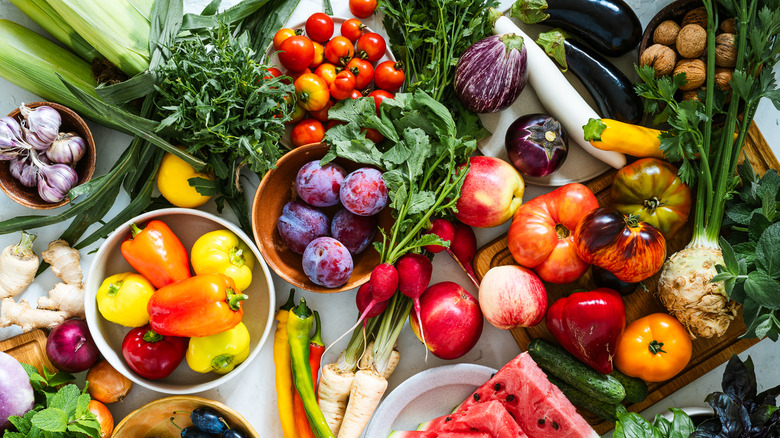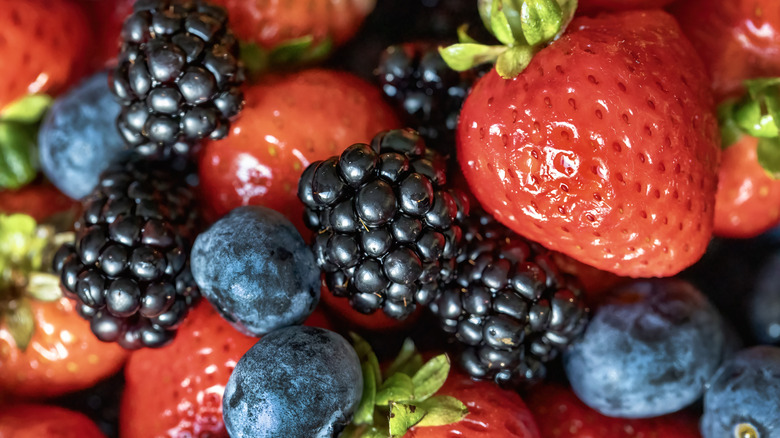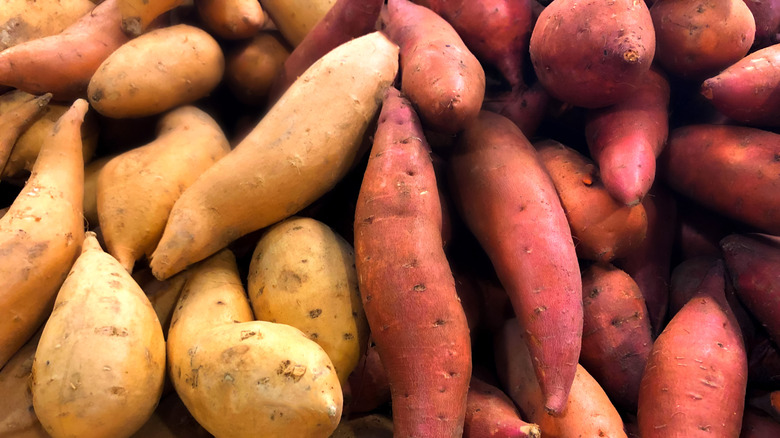This Common Mistake Is Making Your Fruit Spoil Faster
It happens to everyone — you come home with a batch of beautiful, perfectly ripe fruits and veggies only to find they've gone disastrously bad a day or two later. Of course, this could be because they'd been in the grocery store longer than you thought — produce does, after all, have to make it through harvesting and shipping before it gets to you. However, if you find this happening to you more often than not, the culprit might not be your local grocer, but how you're storing your produce. Though every type of fruit and vegetable is a little different, most produce lasts longest when stored in a cool, dry environment.
Moisture and heat are what's used to break food down during the cooking process, so it makes sense they'd be the death knell to fresh produce on your counter by causing them to become soft and break down faster. Additionally, bacteria and fungi both need a warm, wet environment to reproduce, making soggy fruits and vegetables their ideal breeding ground. This is why it's crucial to keep your produce away from appliances when choosing where to store it. Though your stove and oven emit the most heat, toasters, microwaves, and coffee makers can also create a hot, moist microclimate that can cause your bananas to brown faster, turn your potatoes green, and shrivel your apples. Move your produce away from these literal hotspots and store it in a well-ventilated area to keep it fresh, crisp, and juicy for much longer.
Store most fruits and veggies in the fridge
Just like certain plants favor different seasons and growing zones, so, too, do certain fruits and veggies remain freshest when stored in a particular way. Though there are a handful of important exceptions to this rule, the vast majority of fresh produce retains peak ripeness when kept in your refrigerator. This is because the cold, dry environment inside helps inhibit the growth of bacteria, pathogens, and fungi that cause fruit and veggies to become limp and squishy. You can help this process out by thoroughly washing your produce with a vinegar solution, which removes a lot of germs without changing the flavor of your food. Just be sure to let everything air dry completely before putting it in your fridge.
Of course, common wisdom also cautions against storing certain foods together because of ethylene production. Ethylene is a hormone that plants release as they ripen, which can also accelerate the ripening of nearby produce, causing it to spoil faster. For this reason, be sure to store melons, most tree fruits, and strawberries away from brassicas, cucumbers, and fresh herbs.
Store some fruits and veggies at room temp
Produce shipped to grocery stores has to make it to the shelves without going bad, so fruits and veggies that continue to ripen after they're picked are often harvested early and shipped in refrigerated trucks. This is especially advantageous for produce that doesn't ripen under refrigeration, as they're almost guaranteed to survive the trip. It also explains the piles of rock-hard avocados and bright green bananas in the grocery store. With fruits and veggies like these, the best way to store them is to place them in a paper bag on your counter for a few days until they're ripe enough to eat. You can then use them right away or put them in the fridge to extend their life for a little longer. However, if you don't have any immediate plans for them, you can also let them ripen more slowly in a bowl or on a plate — just keep them away from hotspots in your kitchen and ensure they're well-ventilated.
The one type of produce you should almost never refrigerate is potatoes, including sweet potatoes and other starchy root vegetables such as taro. At room temperature, potatoes and similar tubers emit very little ethylene, allowing them to remain fresh for up to two months. However, ethylene production increases when they're chilled, which can cause spoilage in as little as two weeks. Instead, keep them in a cool, dry, dark area of your pantry, preferably away from onions so neither sprouts.


